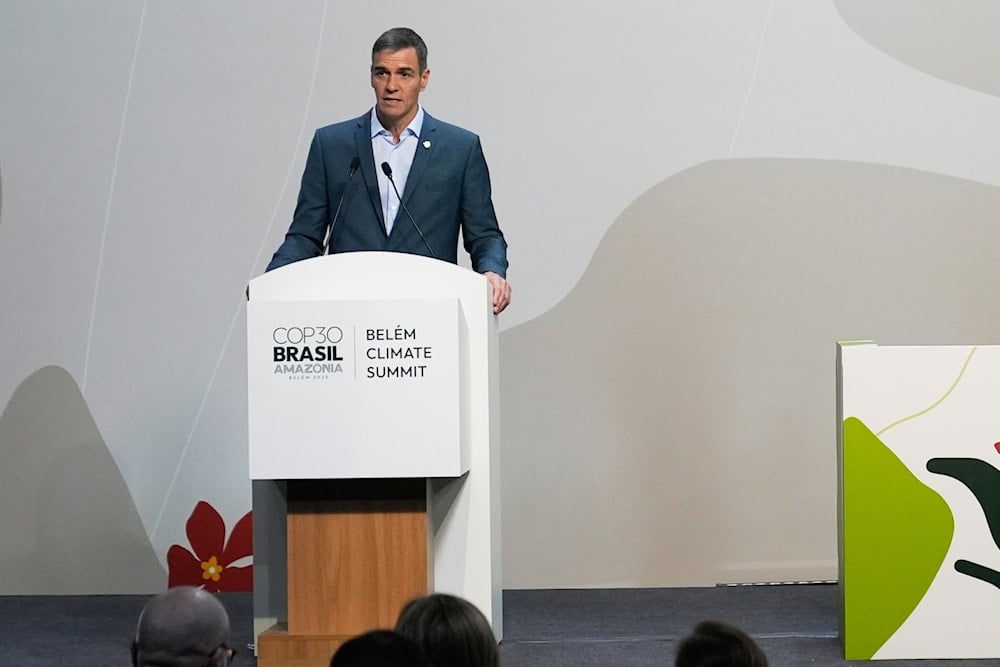Spain prioritizes normalizing ties with Mexico amid renewed tensions
Spain's prime minister says improving ties with Mexico is a priority, as Mexico renews calls for Spain to apologize for colonial-era abuses.
-

Spain Prime Minister Pedro Sanchez speaks during the COP30 UN Climate Summit in Belem, Brazil, Friday, Nov. 7, 2025 (AP)
After years of diplomatic tensions stemming from Spain's colonial past, Spanish Prime Minister Pedro Sanchez stated on Sunday that improving relations with Mexico is a priority for his government.
In an interview for the El Pais daily, Sanchez acknowledged the “light and shadow” in their shared history, while stressing that recognizing both is key to building stronger relations.
“I can guarantee that for Spain, normalizing our relations with a country we consider very close is a priority," he stated.
Noting the historic and cultural bonds between the two nations, the prime minister highlighted Mexico’s support for Spanish exiles after the 1936-39 civil war.
Strained relations
Relations between the two nations have been strained in recent years because of repeated calls from Mexican leaders for Spain to issue an official apology for colonial-era abuses.
This tension was notably ignited in 2019 when then-President Andres Manuel Lopez Obrador sent a letter to Spain’s King Felipe VI, specifically demanding an apology for the abuses committed during the 1519-1521 Spanish conquest of Mexico and the subsequent three centuries of colonial rule.
At the time, Spain formally rejected the request, and the King did not issue a public response.
The diplomatic issue was recently brought back to the forefront last month when incumbent Mexican President Claudia Sheinbaum renewed the calls for an official apology.
In response to this renewed pressure, Spain’s Foreign Minister Jose Manuel Albares acknowledged the “pain and injustice” that was inflicted on Indigenous peoples during the Spanish conquest of the Americas.
He further added, “There was injustice — it is only fair to recognize it today, and fair to regret it. Because that is also part of our shared history, and we cannot deny or forget it.”
A fraught shared history
The Spanish conquest of Mexico began in 1519, when conquistador Hernán Cortés led an expedition of several hundred soldiers into the heart of the Aztec Empire. Armed with steel weapons, horses, and firearms, technologies unknown to the Indigenous peoples, Cortés also forged crucial alliances with rival groups, who saw in the Spaniards an opportunity to break Aztec domination.
By 1521, the Aztec capital of Tenochtitlán, the site of modern-day Mexico City, fell after a brutal siege marked by famine, disease, and mass slaughter. The conquest dismantled one of the most sophisticated civilizations of the pre-Columbian Americas.
In its place, Spain imposed a colonial regime rooted in Catholicism, feudal landholding, and racial hierarchy. Indigenous peoples were forced into conversion and labor under the encomienda system, which effectively enslaved them under Spanish landowners and missionaries.
The introduction of European diseases, especially smallpox, decimated native populations. Some estimates suggest up to 90 percent mortality in the decades following conquest, transforming the demographic and cultural landscape of the continent. The colonial encounter gave rise to a complex mestizo identity, blending Indigenous and Spanish heritage but often under conditions of coercion and inequality.
Even after Mexico’s independence in 1821, the legacies of the conquest persisted in language, religion, art, and social structures. Tensions over historical memory continue to shape Mexico’s relationship with Spain today. Periodic calls for formal apologies from the Spanish Crown for colonial atrocities reflect the enduring wounds of conquest, as well as the broader struggle to reconcile pride in shared cultural heritage with the trauma of subjugation.

 4 Min Read
4 Min Read










